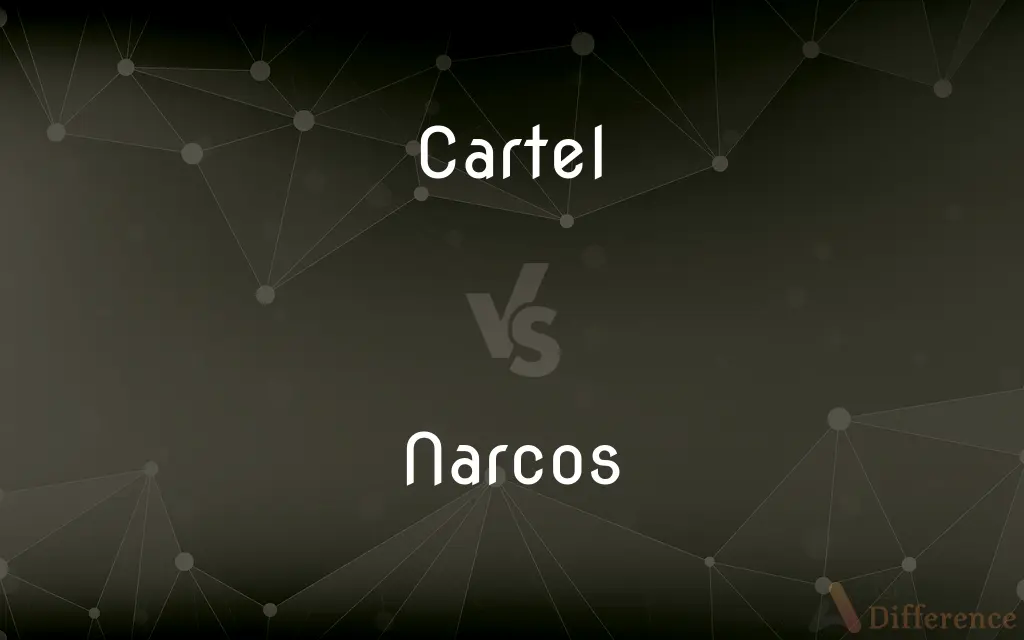Cartel vs. Narcos — What's the Difference?
By Tayyaba Rehman & Maham Liaqat — Updated on April 27, 2024
A cartel is an organized criminal syndicate specializing in drug trafficking and other illicit activities, while narcos refers to the individuals involved in these criminal operations.

Difference Between Cartel and Narcos
Table of Contents
ADVERTISEMENT
Key Differences
A cartel is typically a formal alliance of producers or suppliers in the illegal drug trade aiming to control the market, set prices, and reduce competition. While "narcos," a colloquial term derived from "narcotraficantes," refers to the members of these cartels who are directly involved in the drug trafficking operations.
Cartels are structured like corporations, with hierarchical levels of command and control, including leaders, enforcers, and various operatives. Whereas narcos can vary in their roles within the organization, ranging from high-level bosses to low-level dealers and smugglers.
Cartels often engage in other criminal activities beyond drug trafficking, such as money laundering, extortion, and arms trafficking, to further their power and influence. On the other hand, narcos are specifically those individuals who are involved in the narcotics trade, regardless of their additional involvement in other criminal activities.
The operations of a cartel are extensive, often spanning multiple countries and involving intricate logistics for manufacturing, transporting, and distributing drugs. Whereas narcos are primarily concerned with the operational side of these activities, focusing on the execution of tasks that sustain the drug trade.
In combating these entities, governments and international bodies focus on dismantling cartels as whole organizations through strategic, legal, and military means. While the focus on narcos often involves direct law enforcement action to capture or neutralize individuals involved in drug trafficking.
ADVERTISEMENT
Comparison Chart
Definition
An organized syndicate in the illegal drug trade
Individuals involved in drug trafficking
Structure
Hierarchical organization with defined roles
Members at various levels of the organization
Activities
Drug trafficking, money laundering, etc.
Primarily drug trafficking
Scope
Often international
Can operate locally or internationally
Law Enforcement
Targets the organization as a whole
Focuses on individuals within the trade
Compare with Definitions
Cartel
An organized network involved in international drug trafficking.
The Sinaloa Cartel controls a significant portion of the drug flow into the United States.
Narcos
Those who are specifically engaged in the sale, transport, or production of drugs.
Narcos in rural areas often produce and initiate the distribution of methamphetamine.
Cartel
A cooperative group that agrees to avoid competition by controlling prices and markets.
The cartel members met secretly to fix prices on their narcotics.
Narcos
People who can be at any level of a drug trafficking organization.
From street dealers to cartel bosses, all are considered narcos.
Cartel
An entity targeted by international law enforcement agencies.
The cartel became a prime target for a joint operation by DEA and local police.
Narcos
Often portrayed in media and popular culture as ruthless criminals.
The TV show depicts narcos and their violent dealings within the cartel.
Cartel
A criminal organization that engages in other illicit activities to strengthen its operations.
The cartel diversified into human trafficking to increase its revenues.
Narcos
Individuals involved in the illegal narcotics trade.
Narcos often use sophisticated methods to avoid detection by authorities.
Cartel
A syndicate with a hierarchical structure from leaders to foot soldiers.
He climbed the ranks within the cartel, eventually overseeing distribution in his region.
Narcos
Subjects of law enforcement and anti-narcotics operations.
Narcos were caught in a raid last night after a tip-off.
Cartel
A cartel is a group of independent market participants who collude with each other in order to improve their profits and dominate the market. Cartels are usually associations in the same sphere of business, and thus an alliance of rivals.
Narcos
Narcos is an American crime drama streaming television series created and produced by Chris Brancato, Carlo Bernard, and Doug Miro. Set and filmed in Colombia, seasons 1 and 2 are based on the story of drug kingpin Pablo Escobar, who became a billionaire through the production and distribution of cocaine.
Cartel
A combination of independent business organizations formed to regulate production, pricing, and marketing of goods by the members.
Narcos
Plural of narco
Cartel
An official agreement between governments at war, especially one concerning the exchange of prisoners.
Cartel
A group of parties, factions, or nations united in a common cause; a bloc.
Cartel
(economics) A group of businesses or nations that collude to limit competition within an industry or market.
Drug cartel
Car cartel
Cartel
A combination of political groups (notably parties) for common action.
Cartel
(historical) A written letter of defiance or challenge.
Cartel
An official agreement concerning the exchange of prisoners.
Cartel
A ship used to negotiate with an enemy in time of war, and to exchange prisoners.
Cartel
An agreement between belligerents for the exchange of prisoners.
Cartel
A letter of defiance or challenge; a challenge to single combat.
He is cowed at the very idea of a cartel.,
Cartel
To defy or challenge.
You shall cartel him.
Cartel
A consortium of independent organizations formed to limit competition by controlling the production and distribution of a product or service;
They set up the trust in the hope of gaining a monopoly
Common Curiosities
How do governments combat narcos and cartels?
Through law enforcement actions, legal prosecutions, and sometimes military interventions.
What is the primary goal of a drug cartel?
To monopolize drug markets and maximize profits through collective control.
How do cartels affect local economies?
They can both stimulate and harm local economies through investment and violence.
What is the difference between cartels in different countries?
Their operations and influence can vary significantly based on local conditions and global demand.
Why do narcos often engage in other types of crime?
To diversify their income and strengthen their control over territories.
What methods do cartels use to control their territories?
Through violence, corruption, and economic influence.
Are all narcos violent?
Not necessarily, though the trade itself is associated with high levels of violence.
What role do narcos play in the global drug trade?
They are key operatives in the production, distribution, and sale of narcotics worldwide.
How do narcos impact communities?
Their activities can lead to social decay, increased violence, and instability.
Can a narco operate independently of a cartel?
Yes, although they often operate within the structure of a cartel for protection and resources.
Who are considered narcos?
Individuals at any level of involvement in the illegal drug trade.
How do cartels influence politics?
They can wield significant power by corrupting officials and influencing political outcomes.
What is the difference in the scale of operations between narcos and cartels?
Narcos operate at the execution level, while cartels manage operations on a strategic scale.
What risks do narcos face in their line of work?
They face high risks of arrest, death, and betrayal within their own ranks.
Can a narco rise to become a leader in a cartel?
Yes, many high-ranking cartel members started as lower-level narcos and ascended through loyalty and success in operations.
Share Your Discovery

Previous Comparison
Bergall vs. Cunner
Next Comparison
Appreciate vs. ValueAuthor Spotlight
Written by
Tayyaba RehmanTayyaba Rehman is a distinguished writer, currently serving as a primary contributor to askdifference.com. As a researcher in semantics and etymology, Tayyaba's passion for the complexity of languages and their distinctions has found a perfect home on the platform. Tayyaba delves into the intricacies of language, distinguishing between commonly confused words and phrases, thereby providing clarity for readers worldwide.
Co-written by
Maham Liaqat















































